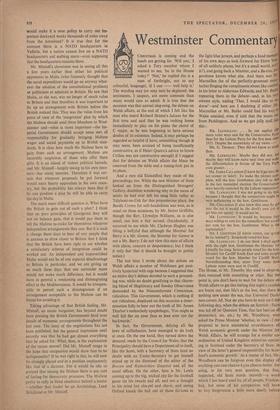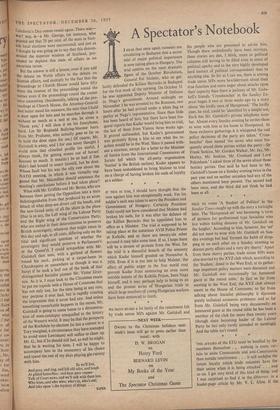Westminster Commentary
CHRISTMAS is coming and the heads are getting fat. Will you,' I
asked a Tory member whom I wanted to see, 'be in the House today?' Not,' he replied (he is a man of forthright, not to say colourful, language), 'if I can — well help it.' The wording may (or may not) be deplored; the sentiments, I suspect, are more common than many would care to admit. It is true that the occasion was that annual sing-song, the debate on Welsh affairs, at the end of which I felt like the man who heard Richard Strauss's Salotne for the first time and said that he was rushing home immediately to play on his piano the chord of C major, as he was beginning to have serious doubts of its existence. Indeed, it may perhaps be regarded as helpful (I have, astonishing though it may seem, been accused of being insufficiently constructive, as if Henri Quatre's advice to brave Crillon was not constructive enough) if I suggest that for debates on Welsh affairs the Mace be removed from the table and a tuning-fork put in its place..
And a rare old Eisteddfod they made of the proceedings, too. While the new Minister of State looked on from the Distinguished Strangers' Gallery, doubtless wondering why in the name of sanity he had ever left his snug little valley at Talybont-on-Usk for this preposterous place, the Bardic Crown for soft-headedness was won, as is usual on these occasions, by Mr. James Griffiths, though the Rev. Llywelyn Williams, as is also usual, ran him a fair second. (Incidentally, it occurred to me while Mr. Cledwyn Hughes was lilting a bellyful that although the Member for Barry is a Mr. Gower, the Member for Gower is not a Mr. Barry; I do not view this state of affairs with alarm, concern or despondency, but I think it only fair that it should be brought to public notice.) The last time I wrote about the debate on Welsh affairs a number of Welshmen got posi- tively hysterical with rage because I suggested that an entire day's debate devoted to such a proceed- ing was, while no doubt gratifying to that charm- ing blend of illegitimacy and Sunday Observance demanded by the Nonconformist Conscience, ridiculous. This Government, which is nothing if not ridiculous, displayed on this occasion a deter- mination fully to bear out the truth of Mr. James Thurber's melancholy apophthegm, 'You might as well fall flat on your face as lean over too far backwards.'
In fact, the Government, defying all the laws of callisthenics, have managed to do both at once. On the one hand, they turned down the demand, made by the Council for Wales, that the Principality should have a Department all to itself, like the Scots, with a Secretary of State (and no doubt with an Under-Secretary to get himself mixed up in the dismissal of the editor of the Brecon and Radnorshire Gazette) and all the usual offices. On the other, here is Mr. Lewis coming up to the big, wicked city for the football game (in his tweeds and all, and not a thought in his mind but cha-pel and cho-ir, and seeing Oxford knock the hell out of those fel-lows in
the light blue jerseys, and perhaps a fond memory of his own days as lock forward for Ebbw Vale' of all unlikely places, but it's a small world, is•n I it?), and going back a Minister, and a Ba-ron, and goodness knows what else. And there was hlr. Macmillan (he of the perfectly-groomed mous: tache) flinging the compliments about like confetti in his letter to Alderman Edwards, and Mr. Butler repeating them in the debate—and, in his very ownest style, adding 'That, I would like W en• dorse'—and here am I doubting if either Mr. Macmillan or Mr. Butler could find his way to Wales unaided, even if told that the trains ran from Paddington. And so we got jolly stuff like this: MR. LLEWELLYN: . . . In our capital city more votes were cast for the Conservative Part1 than for the Labour Party for the first time since 1935. Despite the eccentricity of my views--- MR. G. THOMAS: They did not know as much then.
MR. LLEWELLYN: Maybe they did not, but maybe they will know more next time and make the differentiation in favour of the Tory Part/ even greater. . . .
MR. JAMES CALLAGHAN [I knew he'd get into the act sooner or later]: To make the picture corn' plete, will the hon. Gentlemen also tell us that in the last municipal election the Conservatives were heavily outvoted by the Labour supporters?
MR. LLEWELLYN : I was not going to do that because I thought that the comparison might 110 very unflattering to the hon. Gentleman. MR. CALLAGHAN [I also knew that once he got into the act it would be the devil's own job to get him out again]: It would not be.
MR. LLEWELLYN It would be, because they were willing to vote for the councillors but would not vote for the hon. Gentleman. What is the explanation?
MR. J. GRIFFITHS [if winter comes, can spring be far behind?]: Somebody voted for him.
MR. LLEWELLYN: I do not think I shall agree with the .right hon. Gentleman the Member for Llanelly for long. Some people voted for the hon. Member for Cardiff South East and some people voted for the hon. Member for Cardiff West. Notwithstanding that, more Tory votes than Labour votes were cast in Cardiff.
The House, as Mr. Timothy Shy used to observe, then resumed with something or other. But the point is, you don't have to wait for the debate on Welsh affairs to get this feeling that night's candles are burnt out, that life's at the lees, that there is nothing new under the sun, that Universal Dark- ness covers All. Nor do you have to wait until the following day, when the debate on Scottish r.ffairs was led off (at Question Time, that last bastion of democracy, etc. etc.) by Mr. Woodburn, who asked the Prime Minister 'whether, in view cf the proposal to have ministerial co-ordination of Welsh economic growth under the Minister for Welsh Affairs, he will arrange for a similar co- ordination of United Kingdom ministries operat- ing in Scotland under the Secretary of State, in view of the latter's general responsibility for Scot- land's economic growth.' As a matter of fact, Mr. Woodburn can be forgiven even this display of anything-you-can-chauve-I-can-chauve-better for using, in his very next question, that fine, neglected, old Scots words 'outwith'—a word which I last heard used by, of all people, Frankie- boy, but some of his compatriots will have to buy forgiveness a little more dearly before Caledonia's Day comes round again. There was— Was? nay, is—a Mr. George, for instance, who
pointed out that 70 per cent. of the seats in Scot- tish local elections were uncontested, and just as I thought he was going on to say that this demon-
strated the superior wisdom of Scotland, pro- ceeded to deplore this state of affairs in no uncertain terms.
But the answer is still a lemon, even if you add the debate on Welsh affairs to the debate on Scottish affairs, and multiply by the fact that the proceedings at Church House would have fifty times the interest of the proceedings round the corner even if the proceedings round the corner were interesting. (Incidentally, talking of the pro- ceedings at Church House, the Attorney-General
had better mend his manners; the next time I hold a door open for him and he marches through it without so much as a nod at me, let alone a Thank you,' I will slam it on his funnybone, hard. Let Sir Reginald Bullying-Manner learn from Mr. Profumo, who actually goes so far as to hold the door open for me.) Of course, Mr. Gaitskell is away, and I for one never thought I could miss that chiselled profile (so useful, I always think, for getting stones out of horses' hooves) so much. It wouldn't be so bad if Jim didn't feel bound to assert himself, but he does. Whose fault but his was the silly row about the NATO meeting, in which it was virtually sug- gested that Mr. Macmillan should announce the meeting's conclusions before it had taken place? What with Mr. Griffiths and Mr. Bevan, who are between them getting the Opposition into a state indistinguishable from that produced by an acute attack of what deep-sea divers call the bends, and the new-found unity of all the idiots in the place (that is to say, the Left wing of the Labour Party and the Right wing of the Conservative Party, who are united in their determination to preserve British sovereignty, whatever that might mean in this day and age, at all costs, differing only on the vital and significant question of whether the sovereignty they would preserve is Parliament's or the Queen's), I could sympathise with Mr. Gaitskell (last seen, with a garland of flowers round his neck, picking at a carpet-loom in Chandrapore or somewhere as though it was a harp) if he took a leaf out of the book of that distinguished Socialist pioneer Mr. Victor Gray- son. As it is, I must look to the Christmas recess to put me topside with a House of Commons that has not only lost, for the time being at any rate, any purpose it ever had, but is rapidly creating the impression that it never had any. And unless something remarkable happens in the recess, Mr. Gaitskell is going to come home to a demonstra- tion of mass-catalepsy unequalled in the history of the Western world. It may be that the prospects of the Rochdale by-election (at last a contest in a Tory marginal, a circumstance they have managed to avoid since Lewisham) will suffice to cheer up Mr. G., but if he should still feel, as well he might, that he is wasting his time, I will be happy to accompany him to the monastery of his choice and spend the rest of my days playing gin-rummy with him.
So we'll live, And pray, and sing, and kill old tales, and laugh At gilded butterflies : and hear poor rogues Talk of Court news, and we'll talk with them too, Who loses, and who wins; who's in, who's out;
. And take upon 's the mystery of things. . . .



































 Previous page
Previous page